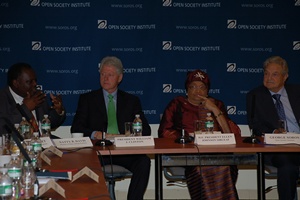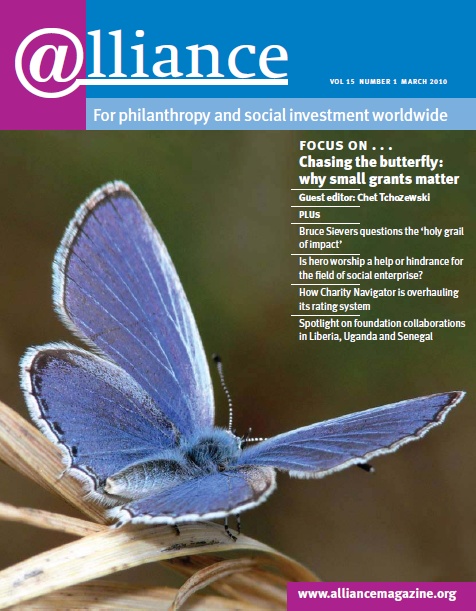Given Liberia’s recent history, it’s almost impossible to imagine my country as the starting point for a positive social innovation like the exciting new collaborative model for philanthropy that we are now piloting. But fortunately, following a brutal 14-year civil conflict that killed an estimated 270,000 people and ruined the lives of countless others, Liberians saw and grabbed their chance for a fresh start in 2005 when we elected Ellen Johnson Sirleaf as the first-ever female African head of state.
Under the leadership of President Sirleaf, strong early progress has been made to begin to put years of bloodshed and pain behind us. Liberia has averaged 7 per cent economic growth over the last four years; we have constructed and renovated 215 schools and 30 hospitals and clinics and partially restored power and water to our largest cities for the first time in 14 years. It is no small measure of our progress that for the first time in two decades, six-year-olds in Liberia can start school having known only an environment of peace.
The importance of partners
Partners have been critical to this progress. The UN peacekeeping force, for example, has been integral to securing the country’s stability, and many bilateral and multilateral partners, ranging from the US government to the African Development Bank, have provided support that has helped keep our progress on track.
From the start of the Sirleaf administration, foundations and philanthropists quickly demonstrated their unique potential to affect Liberia’s rehabilitation and development positively. For example, while the president’s commitment to reform and good policies was important, realizing these good intentions required a strong leadership team around her. It was the Open Society Institute that immediately assisted in this urgent task by initiating a programme to attract a group of top technocrats, a number of whom were residing outside Liberia.
Later, as government capacity limitations continued to constitute a core impediment to progress, philanthropist Ed Scott – eventually joined by foundations including Humanity United, the McCall MacBain Foundation, Open Society Institute, the Nike Foundation and the Belinda Stronach Foundation – provided generous support for a new programme that brought young professionals, a mix of Americans and Liberians from the diaspora, to work as special assistants to key senior Liberian government officials. Several foundations also supported the Senior Executive Service, which recruited a cadre of professional Liberians from at home and abroad to strategic government posts.
A few factors are notable here, particularly from the perspective of a post-conflict government. First, while lengthy procurement procedures and other complicated institutional factors have sometimes led to unfortunate delays in the implementation of projects funded by the traditional bilateral and multilateral partners, the speed and flexibility with which these foundations and individuals were able to act was enormously beneficial. We are also impressed and inspired by the willingness of our philanthropic partners to view our government as a partner, most notably in those programmes that sought to directly bolster government capacity.
 Working with foundations
Working with foundations
Two key meetings in 2008 helped to illuminate the impact that philanthropy was making and also to highlight some simultaneous challenges that needed to be addressed. In May of that year, the NoVo Foundation organized a gathering of the main foundations then supporting projects in Liberia. This paved the way for a September meeting co-convened by President Sirleaf and George Soros – the first forum for the foundations and the Liberian government to collectively explore the role of philanthropy in the country.
Several themes emerged from these gatherings. First, while the foundations expressed a desire to continue to contribute to Liberia’s development, they highlighted a number of key challenges. Some noted difficulties such as not knowing how to obtain key information such as relevant government documents or the right people to contact for answers to policy questions. Meanwhile, both the government and the foundations agreed on the need to strengthen information sharing so as to encourage greater philanthropic collaboration and co-funding of initiatives in Liberia. The government also articulated its own nascent understanding of how to effectively engage the foundations – a new breed of partner compared to many of Liberia’s bilateral and multilateral partners.
Just days later, at the 2008 Clinton Global Initiative, a group of Liberia’s philanthropic partners announced a joint Commitment to ‘Come Together for Liberia’s Future’. This pledge responded to a number of the key issues that had emerged from the May and September meetings and promised a renewed effort to collaborate to amplify the impact of philanthropy in the country.
A government hub for philanthropic support
In line with this CGI Commitment, the Liberian government conceived the idea of a new office that would serve as a hub to facilitate the work of foundations in Liberia. The Liberia Philanthropy Secretariat, as it would eventually come to be known, was launched in April 2009 with the generous support of five of Liberia’s key philanthropic partners. It would have two broad primary objectives. First, it would function as a joint resource for Liberia’s current philanthropic partners; a gateway to provide information, facilitate links for foundations with relevant government officials and NGOs, and assist with foundation representatives’ visits to the country. Second, it would try to expand the group and encourage new foundations and philanthropists to begin supporting projects in Liberia. The unit would be small – just two full-time staff – and initially housed within the Office of the President to ensure that foundations could avoid becoming entrenched in some of the more challenging aspects of Liberia’s government bureaucracy. Though the concept is a basic one, we were surprised to learn that, in fact, no similar office exists in any other country.
While nine months is certainly not enough to deliver a verdict on this new model for government-foundation collaboration, we have seen a number of early successes. I believe the secretariat has fostered improved information sharing, both by being more responsive to our current and potential philanthropic partners and through new mechanisms such as a recently launched secretariat website, SupportLiberia.com. We are seeing some exciting moments where collaboration between the foundations is taking root, such as a group pledge made by philanthropists in support of a critical project highlighted by the Minister of Agriculture at our 2009 annual meeting in New York between the foundations and government. That said, the secretariat could and will do more to foster these opportunities for partnership.
We also believe a number of exciting initiatives are emerging. The secretariat is working to facilitate partnerships between US-based fiscal sponsors and a number of local NGOs in Liberia. This will make it easier for smaller donors to support Liberian NGOs through a trusted US-registered 501(c)(3) intermediary and has the potential to open new channels for philanthropy. Meanwhile, a group of strategic philanthropists and foundations from the US will be visiting Liberia in February to learn more about the opportunities for philanthropy to have a transformative impact in our country.
The challenge of the new
As the first of its kind, the secretariat is encountering challenges along the way and is continuing to learn on its feet. Something that we’re trying to better understand is the extent to which the secretariat should actively seek to guide where and how foundations support government priorities, as opposed to allowing foundations to identify their own areas of interest. To date, we’ve experimented with different approaches – for example, the joint agriculture commitment mentioned above had been highlighted as a government priority – and we’re still in the process of identifying an approach that’s right for us and our philanthropic partners. We’re also seeking to improve our coordination with government ministries and agencies. For example, typically, after the secretariat has initiated an interaction with a foundation, it will link the foundation to a contact within the appropriate line ministry or agency. In some cases, there have been issues in the ensuing interactions between the foundation and that government office.
In the future, we hope to find new opportunities for foundations to collaborate not only with each other but with our bilateral and multilateral partners too. Meanwhile, we think the secretariat can continue to be helpful, particularly for smaller family foundations and individual philanthropists seeking to work in Liberia. We hope this leads to an expansion not just in the volume of philanthropic support for Liberia but also, more importantly, in the number of strong partnerships with foundations that our country has benefited from since the end of the conflict.
It’s still early, but we’re positive about the progress made during our first year. And we believe philanthropy can continue to play a central role in paving a brighter future for our country.
O Natty B Davis II is Minister of State without Portfolio and Head of the Philanthropy Secretariat, Republic of Liberia.
For more information
http://www.SupportLiberia.com
Contact Liberia Philanthropy Secretariat programme manager Dan Hymowitz at dhymowit@gmail.com



Comments (0)